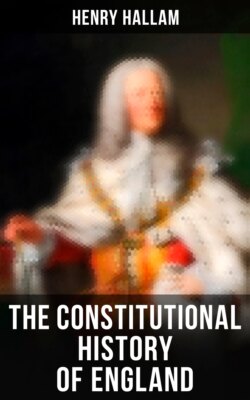The Constitutional History of England

Реклама. ООО «ЛитРес», ИНН: 7719571260.
Оглавление
Hallam Henry. The Constitutional History of England
The Constitutional History of England
Table of Contents
VOLUME 1
Table of Contents
INTRODUCTION
BIBLIOGRAPHY
PREFACE
CHAPTER I
ON THE ENGLISH CONSTITUTION FROM HENRY VII. TO MARY
CHAPTER II
ON THE ENGLISH CHURCH UNDER HENRY VIII., EDWARD VI., AND MARY
CHAPTER III
ON THE LAWS OF ELIZABETH'S REIGN RESPECTING THE ROMAN CATHOLICS
CHAPTER IV
ON THE LAWS OF ELIZABETH'S REIGN RESPECTING PROTESTANT NONCONFORMISTS
CHAPTER V
ON THE CIVIL GOVERNMENT OF ELIZABETH
CHAPTER VI
ON THE ENGLISH CONSTITUTION UNDER JAMES I
CHAPTER VII
ON THE ENGLISH CONSTITUTION FROM THE ACCESSION OF CHARLES I. TO THE DISSOLUTION OF HIS THIRD PARLIAMENT
FOOTNOTES
VOLUME 2
Table of Contents
CHAPTER VIII
FROM THE DISSOLUTION OF CHARLES'S THIRD PARLIAMENT TO THE MEETING OF THE LONG PARLIAMENT
CHAPTER IX
FROM THE MEETING OF THE LONG PARLIAMENT TO THE BEGINNING OF THE CIVIL WAR
CHAPTER X
FROM THE BREAKING OUT OF THE CIVIL WAR TO THE RESTORATION. Part I
Part II
CHAPTER XI
FROM THE RESTORATION OF CHARLES THE SECOND TO THE FALL OF THE CABAL ADMINISTRATION
CHAPTER XII
EARL OF DANBY'S ADMINISTRATION—DEATH OF CHARLES II
FOOTNOTES:
VOLUME 3
Table of Contents
CHAPTER XIII. ON THE STATE OF THE CONSTITUTION UNDER CHARLES II
CHAPTER XIV. THE REIGN OF JAMES II
CHAPTER XV. ON THE REIGN OF WILLIAM III
CHAPTER XVI. ON THE STATE OF THE CONSTITUTION IN THE REIGNS OF ANNE, GEORGE I., AND GEORGE II
CHAPTER XVII. ON THE CONSTITUTION OF SCOTLAND—INTRODUCTION OF THE FEUDAL SYSTEM
CHAPTER XVIII. ON THE CONSTITUTION OF IRELAND
FOOTNOTES:
Отрывок из книги
Henry Hallam
Published by
.....
There must be few of my readers who are unacquainted with the animated sketch that Hume has delineated of the English constitution under Elizabeth. It has been partly the object of the present chapter to correct his exaggerated outline; and nothing would be more easy than to point at other mistakes into which he has fallen through prejudice, through carelessness, or through want of acquaintance with law. His capital and inexcusable fault in everything he has written on our constitution is to have sought for evidence upon one side only of the question. Thus the remonstrance of the judges against arbitrary imprisonment by the council is infinitely more conclusive to prove that the right of personal liberty existed, than the fact of its infringement can be to prove that it did not. There is something fallacious in the negative argument which he perpetually uses, that because we find no mention of any umbrage being taken at certain strains of prerogative, they must have been perfectly consonant to law. For if nothing of this could be traced, which is not so often the case as he represents it, we should remember that even when a constant watchfulness is exercised by means of political parties and a free press, a nation is seldom alive to the transgressions of a prudent and successful government. The character, which on a former occasion I have given of the English constitution under the house of Plantagenet, may still be applied to it under the line of Tudor, that it was a monarchy greatly limited by law, but retaining much power that was ill calculated to promote the public good, and swerving continually into an irregular course, which there was no restraint adequate to correct. It may be added, that the practical exercise of authority seems to have been less frequently violent and oppressive, and its legal limitations better understood in the reign of Elizabeth, than for some preceding ages; and that sufficient indications had become distinguishable before its close, from which it might be gathered that the seventeenth century had arisen upon a race of men in whom the spirit of those who stood against John and Edward was rekindled with a less partial and a steadier warmth.463
Parliament of 1621.—The king's speech on opening the session was, like all he had made on former occasions, full of hopes and promises, taking cheerfully his share of the blame as to past disagreements, and treating them as little likely to recur, though all their causes were still in operation.589 He displayed, however, more judgment than usual in the commencement of this parliament. Among the methods devised to compensate the want of subsidies, none had been more injurious to the subject than patents of monopoly, including licences for exclusively carrying on certain trades. Though the government was principally responsible for the exactions they connived at, and from which they reaped a large benefit, the popular odium fell of course on the monopolists. Of these the most obnoxious was Sir Giles Mompesson, who, having obtained a patent for gold and silver thread, sold it of baser metal. This fraud seems neither very extraordinary nor very important; but he had another patent for licensing inns and alehouses, wherein he is said to have used extreme violence and oppression. The House of Commons proceeded to investigate Mompesson's delinquency. Conscious that the Crown had withdrawn its protection, he fled beyond sea. One Michell, a justice of peace, who had been the instrument of his tyranny, fell into the hands of the Commons, who voted him incapable of being in the commission of the peace, and sent him to the Tower.590 Entertaining, however, upon second thoughts, as we must presume, some doubts about their competence to inflict this punishment, especially the former part of it, they took the more prudent course with respect to Mompesson, of appointing Noy and Hakewill to search for precedents in order to show how far and for what offences their power extended to punish delinquents against the state as well as those who offended against that house. The result appears some days after, in a vote that "they must join with the Lords for punishing Sir Giles Mompesson; it being no offence against our particular house, nor any member of it, but a general grievance."591
.....